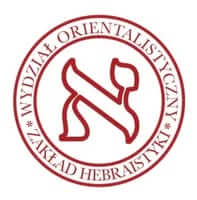Research
The main academic disciplines represented in the Department are Cultural and Religious Studies, Literary Studies and Linguistics. The starting point is the Hebrew language, either contemporary or in one of its historical forms. The conducted research, at times interdisciplinary, falls within the broad fields of Israel Studies and Jewish Studies, in various literary, cultural, historical and linguistic contexts.
Cultural Studies
Thanks to the interdisciplinary approach, Cultural and Religious Studies research conducted in the Department combine historical, linguistic and anthropological perspectives. This approach also often appears in student theses. Cultural and Religious Studies scholars in the Department examine contemporary cultural phenomena in Israel, including issues of memory and identity between Israel and the Jewish Diaspora, as well as intercultural relations and the impact of Judaism on global culture. The traditions of Jewish philosophy and thought also occupy an important place in the conducted studies. Another important point of interest is the period of the Second Polish Republic and the exceptional rise of Hebrew culture and literature that occurred at that time in Poland.
Literary Studies
Literary scholars in the Department lean toward both biblical literature and epigraphy, as well as modern Hebrew literature (20th-21st century). Modern Biblical Studies require a wide range of language skills (Classical Hebrew, Latin, Greek, Aramaic) and extensive historical knowledge. Research on modern Hebrew literature often engages with recent works published in Poland, and contextualizes Hebrew texts in Polish and Israeli reality and past. Research on Hebrew literature written in Israel by Palestinians occupies a special place in the Department’s recent academic output.
Linguistics
Linguistics in the Hebrew Studies Department is carried out both in comparative contexts in the field of Semitic studies (which also requires knowledge of other languages of the region, such as Arabic and Aramaic), as well as through linguistic documentation. Another aspect important to the development of the Department is the practical glottodidactics of Hebrew, which allows our lecturers to teach the language more and more effectively.
See more on the publications, research projects, and conferences of the Department of Hebrew Studies.
